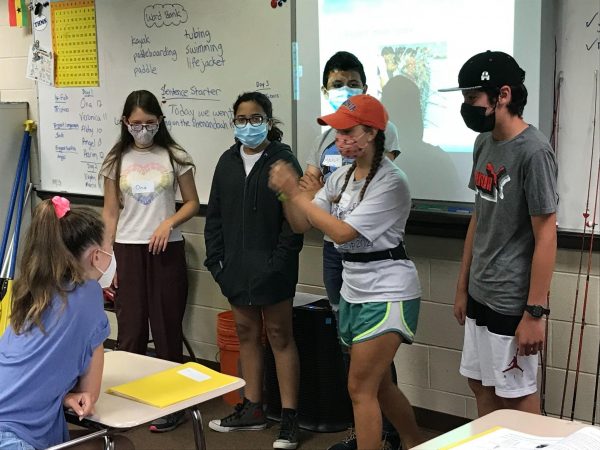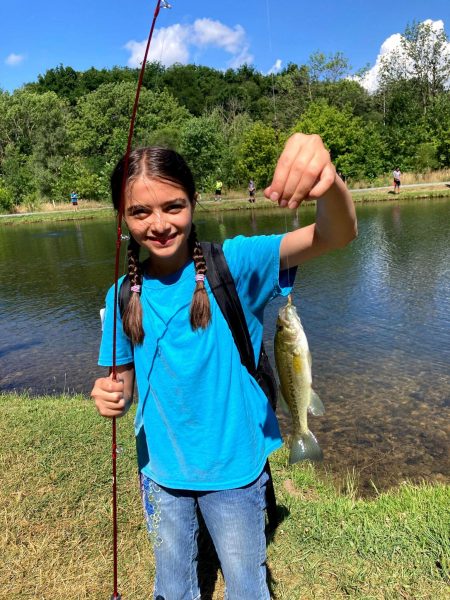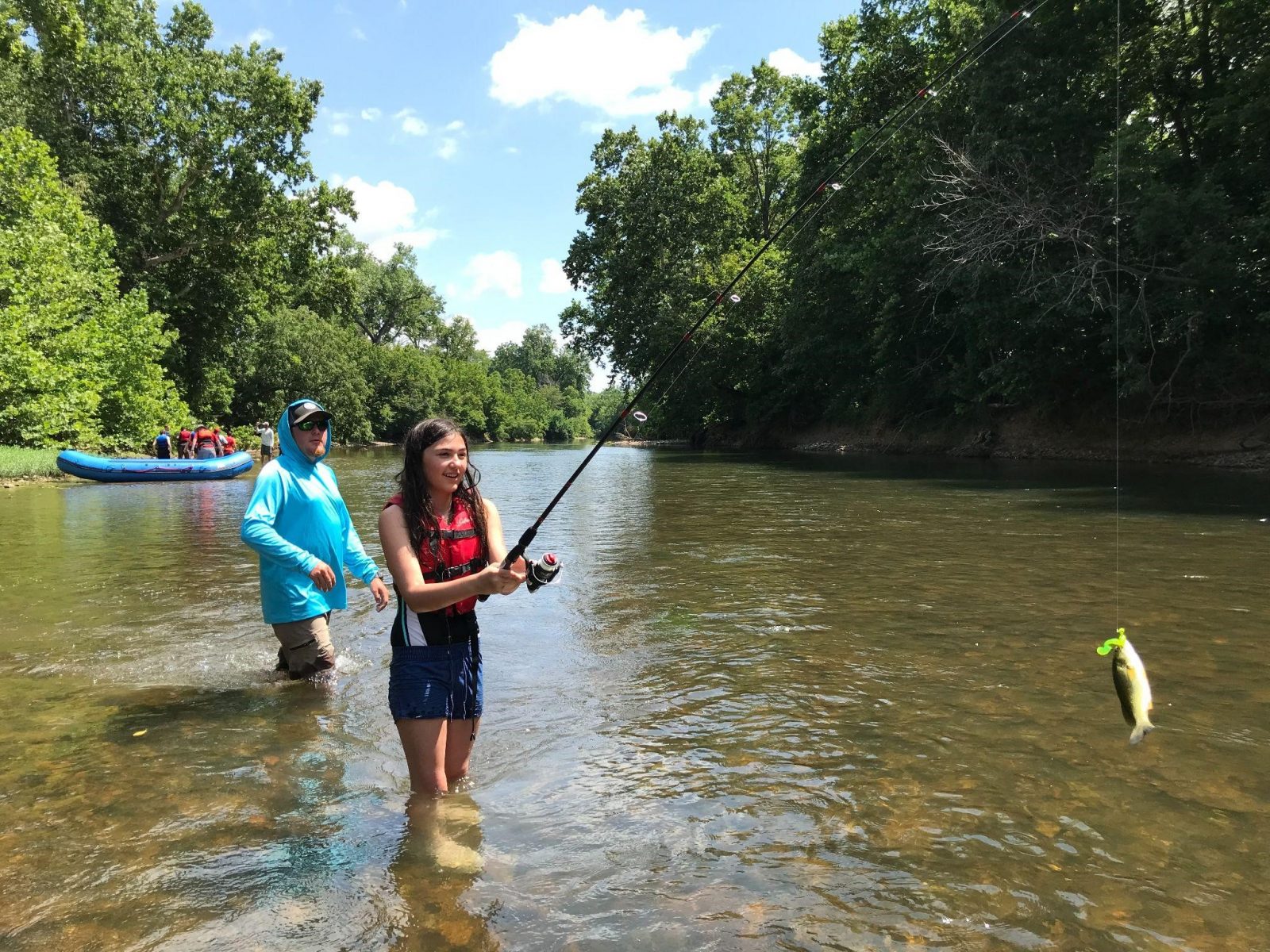DWR is celebrating Hispanic Heritage Month by recognizing the achievements and contributions of Hispanic American champions who have inspired others to achieve success through Virginia’s great outdoors!
 Pescadores Para El Planeta was founded in February, 2018. The objective of Pescadores Para El Planeta was created to provide low income, underserved, Hispanic and immigrant middle school students (ages 10-14) and their families with a meaningful watershed experience where they will unplug and connect to the natural world through fishing and boating. Students and families are taught the basics of recreational spin casting, fly fishing, boating, fishing ethics, regulations, and safety, and put their learning into practice on the water. Fishing, boating, and exploring the natural world bonds families and friends, connects others, and creates lasting, quality memories. Pescadores Para El Planeta makes this happen for our community’s underserved youth and families.
Pescadores Para El Planeta was founded in February, 2018. The objective of Pescadores Para El Planeta was created to provide low income, underserved, Hispanic and immigrant middle school students (ages 10-14) and their families with a meaningful watershed experience where they will unplug and connect to the natural world through fishing and boating. Students and families are taught the basics of recreational spin casting, fly fishing, boating, fishing ethics, regulations, and safety, and put their learning into practice on the water. Fishing, boating, and exploring the natural world bonds families and friends, connects others, and creates lasting, quality memories. Pescadores Para El Planeta makes this happen for our community’s underserved youth and families.
Pescadores Para El Planeta is offered through Harrisonburg City Public Schools and On the Road Collaborative. Harrisonburg is a growing metropolis, having a population of over 53,000 of which 19% are Hispanic or Latino. The Harrisonburg City school system serves a community that is rich in ethnic diversity. At Skyline Middle School alone, we have 44 countries represented in our student population and 46 different native languages spoken. While a majority of participating families will be Hispanic or Latino, the enrichment program will be open to families of all races and ethnicities.
 Students learn basic knot tying and casting using the FESP equipment (closed-faced spinning outfits and Backyard Bass) and instructional plans. They progress into learning how to tie flies and learn fly fishing casting techniques using NFSP equipment. Additionally, students learn about boating safety. Finally, students learn about fishing regulations and licenses, the health of our water, and the safety and hazards of eating fish that are in our local waterways.
Students learn basic knot tying and casting using the FESP equipment (closed-faced spinning outfits and Backyard Bass) and instructional plans. They progress into learning how to tie flies and learn fly fishing casting techniques using NFSP equipment. Additionally, students learn about boating safety. Finally, students learn about fishing regulations and licenses, the health of our water, and the safety and hazards of eating fish that are in our local waterways.
Pescadores Para El Planeta plants the seed for students and their families to explore and embrace the natural resources around them, and inspires them to become caretakers of our environment. There is a great need for Pescadores Para El Planeta in Harrisonburg that reaches out to our thriving immigrant community. Harrisonburg, nicknamed the “The Friendly City” is in need of a program like this that brings families together, teaching them basic angling and boating skills and how to enjoy the natural resources in the Shenandoah Valley.
As a public school teacher in the community for 18 years, I have a base of students and families to reach out to in conjunction with our community’s On the Road Collaborative after school program. My goal is for participants to gain a greater respect for our natural resources and learn how to enjoy boating and fishing with friends and family, creating lasting memories. These experiences may inspire students to conduct research and pursue STEM careers in environmental science. For some, it will bring peace and fill an emotional need. I passionately feel that this program will have a lasting impact on our youth, their families, and community. Participants gain a greater knowledge of the natural world, embrace a new hobby, and foster a sense of stewardship for their local natural resources. My hope is to instill and spread my enthusiasm and love for the outdoors in each student and family member who participates in Pescadores Para El Planeta!
 Describe how your organization or program connects the Hispanic community to the outdoors and/or wildlife in Virginia?
Describe how your organization or program connects the Hispanic community to the outdoors and/or wildlife in Virginia?
In summary, Pescadores Para El Planeta meets its goals in providing meaningful field experiences for our city’s Hispanic and immigrant youth and families. Support from the Recreational Boating and Fishing Foundation and Virginia Department of Wildlife Resources enable me to; lead two fishing/boating afterschool program at two of our city’s middle schools in the fall and spring, introduce casting at recess (exposing fishing to 120 students), lead a weeklong fishing/boating camp under Harrisonburg City Public School’s and On the Road Collaborative’s Summer Enrichment Program, and continue to serve our low income and Hispanic youth and families in the weeklong Pescadores Para El Planeta Summer Camp. Overall, the program provides fishing and boating experiences for over 150 youth. Students and families participated in 25 fishing/boating field experiences totaling over 106 hours on the water! Although the program is open for all ethnicities, the majority of our participants are Hispanic. Our target audience was reached as we served low income students from 14 different countries, including Mexico, Puerto Rico, Iraq, Congo, Nepal, Honduras, Guatemala, Cuba, Eritrea, Dominican Republic, El Salvador, Ecuador, Sweden, Germany and the United States. Many of the program materials are translated into Spanish. One of the program leaders is fluent in Spanish and is able to communicate with students and families. Having a background in working with English Learners, I have extensive experience in working with this unique population and able to offer supports that help our students such as using lots of visuals and language support.
 Describe how the Virginia Department of Wildlife Resources has supported your organization or program and the impact it has had.
Describe how the Virginia Department of Wildlife Resources has supported your organization or program and the impact it has had.
Without the support of the Virginia Department of Wildlife Resources and the Recreational Boating and Fishing Foundation, my program would not exist. Grant funding has enabled me to purchase equipment such as kayaks, paddles, life jackets, fishing rods and reels, tackle, and more. Funding has provided our program to offer field opportunities where students are actively engaged in hands-on learning and real boating and fishing experiences. DWR senior biologist Jason Hallachar has joined several of our field events, specifically on the Shenandoah River. As I take students on a whitewater raft down 3.5 miles of the river, Jason transports all of our fishing gear. We stop off at spots to help students as they wade in the river to catch their first smallmouth bass. The impact this program has had on the community is great. It is a widely popular program and the first to fill in our after school program. Students can’t get enough of the fishing and boating. For many, participating in the summer camp is the highlight of their summer.
 Provide a brief story or real-life example that showcases the impact your efforts have had on the Hispanic community.
Provide a brief story or real-life example that showcases the impact your efforts have had on the Hispanic community.
Pescadores Para El Planeta serves those marginalized students and families who need this type of experience the most. They are families that may not be as aware of the many opportunities offered in the community and may lose out because of language barriers or cost. However, since I intentionally seek out these students and families, I was able to provide this memorable experience.
In my summer program, I secured free meals through Harrisonburg City Public Schools. They provided a free breakfast and packed lunch for each of my campers. School was officially closed so this was a generous offering by the city. The city schools also provided insurance coverage for all of my field trips to the local waters.
On day one, students learned the basics of fishing and boating. The next three days were filled with fishing and boating experiences. One of the most memorable times was when a grandmother showed up to join us. I had invited all parents to join us on our trips. For each parent who attended, I bought them a fishing license (provided by the RBFF grant). My intention was that if parents have a license, they will be more apt to take their child fishing. The grandmother who showed up couldn’t speak a word of English. But we managed to communicate by having the granddaughter translate. The grandmother also brought along two younger siblings of my student. After getting some waivers signed, I was happy to have them join us. This family was so grateful and appreciative of this experience. The grandmother, who was dressed in her country’s traditional clothing, covered from head to toe, was elated to take her first cast using the closed faced spinning outfit. Smiles abound as I was witness to mother and granddaughter experiencing catching pumpkinseed sunfish together for the first time.
On another day, I took the students kayaking and paddle boarding. I will never forget Ecme’s experience. Ecme’s mother is from Mexico and her father from El Salvador. At first, Ecme was shaking in fear about getting on a boat for her first time. In class, we had reviewed boating safety. However, not being able to swim, she was very frightened about being on water. I told her that this was a normal feeling and I assured her that she was safe. She gingerly grabbed the sides of the paddle board and got herself to sit with her legs crossed. Shortly thereafter, she was paddling on her own. The next thing you knew, she was kneeling…and then standing. Before I knew it, she was jumping off of the paddleboard into the deep water. The fear was gone. With life jacket keeping her afloat, she laughed and squealed in delight and laughter. I take great joy in seeing students taking risks, overcoming fears, while showing growth in their confidence and independence. This is why I do this!
 Provide information on how people can support your organization.
Provide information on how people can support your organization.
I value the financial support offered by DWR and RBFF. Without their support, I’m not sure if we could continue to provide this opportunity in our community. I am appreciative for all of our volunteers and partnerships formed throughout the years. We have volunteers and partnerships with Massanutten Chapter of Trout Unlimited, James Madison University, Outdoor Adventures, and numerous vendors who offer discounts on program supplies. My wish and hope for the future of this program would be to recruit more leaders like me and my program assistant who could start up and run more fishing and boating programs from our elementary and high schools.
Para obtener más información sobre el Departamento de Recursos de Vida Silvestre de Virginia y las oportunidades de caza, pesca y recreación al aire libre que existen en Virginia, mire este video.

